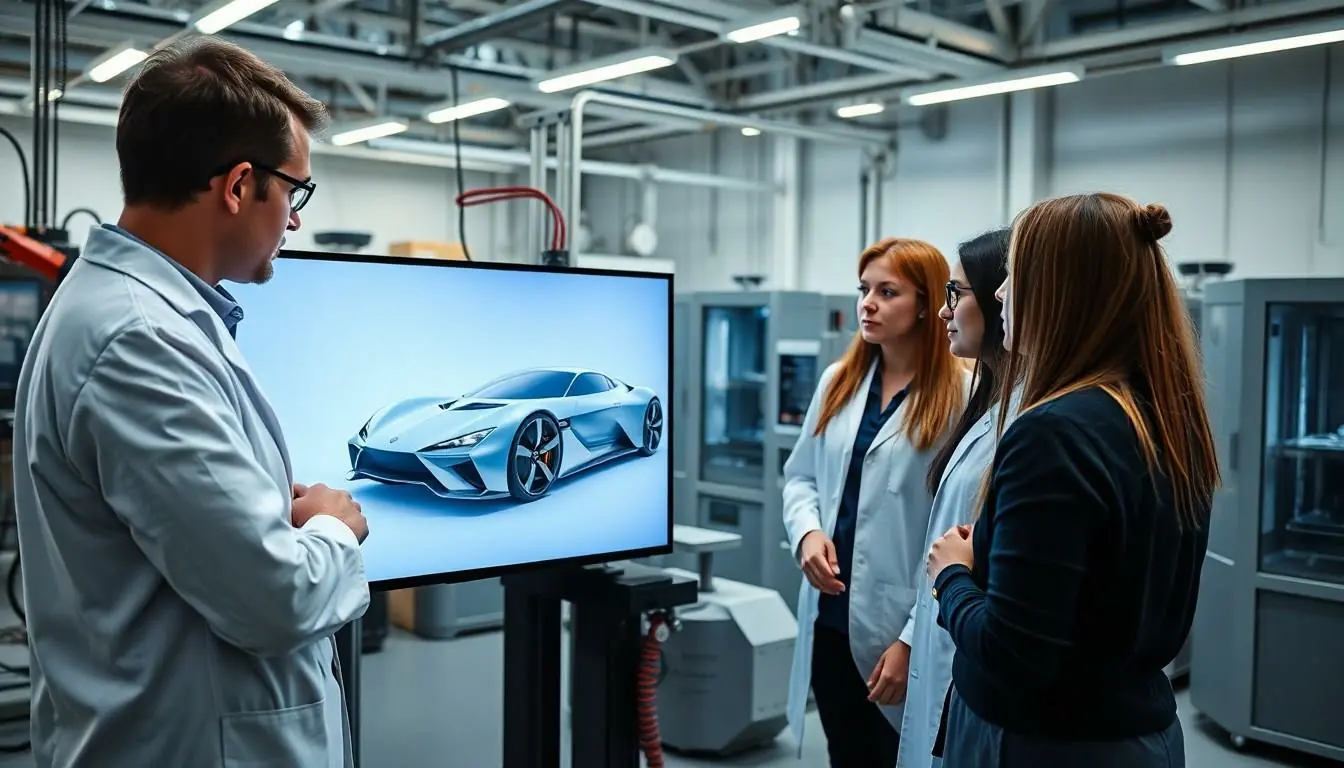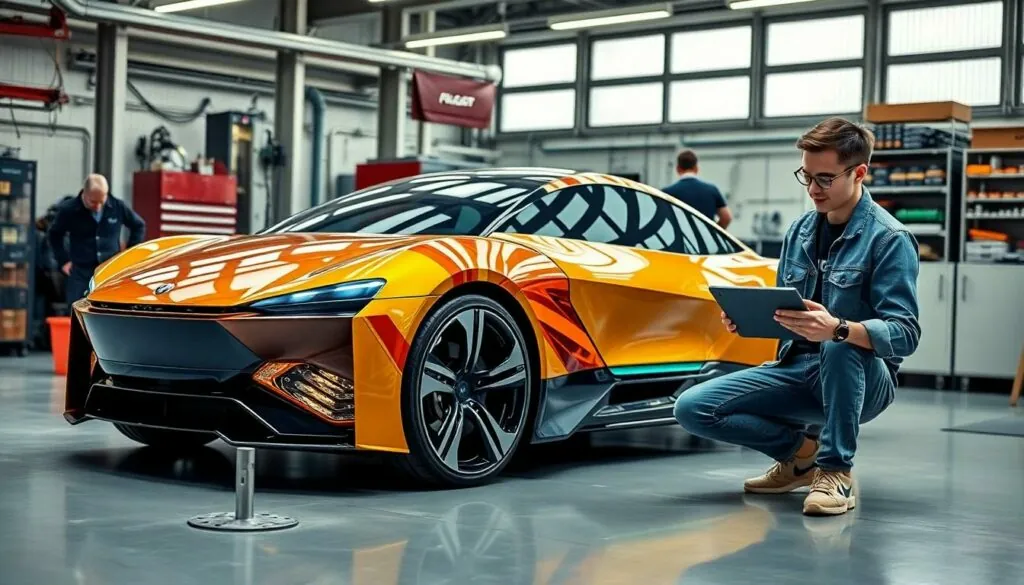Table of Contents
ToggleImagine cruising down the highway in a car that practically reads your mind. With the rise of AI car generators, this dream is inching closer to reality. These innovative systems are revolutionizing the auto industry, transforming how vehicles are designed, manufactured, and even driven.
Gone are the days of cookie-cutter cars that all look the same. Now, drivers can customize their rides with a few taps on a screen, making every vehicle as unique as its owner. Whether it’s a sleek sports car or an eco-friendly hybrid, AI car generators are here to give everyone a chance to hit the road in style—without breaking the bank.
Overview of AI Car Generators
AI car generators represent a significant advancement in automotive design. These systems utilize algorithms to create tailored vehicles, enhancing the personalization aspect of car ownership. Drivers can select features like color, materials, and technological integrations, resulting in distinct automobiles that embody their unique styles.
The technology not only streamlines the design process but also improves efficiency in manufacturing. Automakers can adopt a more flexible production line, accommodating custom requests without substantial delays. Automated algorithms analyze user inputs, producing designs that align with individual specifications while optimizing for performance and safety.
Moreover, affordability becomes a key benefit. AI car generators reduce reliance on traditional, expensive design methods. As a result, more consumers gain access to customized vehicles without facing overwhelming costs. This accessibility fosters a broader market for personalized cars, allowing diverse consumer bases to engage with innovative automotive solutions.
AI car generators also integrate advanced data analytics, providing insights into consumer preferences. By understanding trends and demands, manufacturers can adapt their offerings, ensuring they meet user expectations. Car buyers enjoy not only the thrill of owning a one-of-a-kind vehicle but also the reassurance of purchasing a product that resonates with current automotive trends.
With the automotive industry focusing more on sustainability, AI car generators can accommodate eco-friendly designs. Features like energy-efficient materials and electric vehicle options are easily incorporated into customizations, promoting environmentally responsible choices. As this technology evolves, it holds the potential to reshape the future of personal transportation, catering to individual tastes while addressing broader societal challenges.
How AI Car Generators Work

AI car generators utilize advanced algorithms to revolutionize vehicle design. These systems enable unique customization options for drivers, allowing personalization to flourish.
Key Technologies Involved
Machine learning algorithms function as the backbone of AI car generators. They analyze consumer preferences, leveraging vast data sets to generate customized designs. Generative design software assists in producing optimized vehicle layouts, factoring in aesthetics and functionality. Additionally, virtual reality tools provide immersive experiences, allowing users to visualize their personalized vehicles before production. Advanced manufacturing technologies, such as 3D printing, contribute to the efficient creation of unique components, enhancing the overall design process.
Data Inputs and Outputs
Data inputs originate from various sources, including user specifications and market trends. These inputs inform the AI system to generate tailored designs that align with consumer desires. Outputs returned by the AI consist of detailed vehicle blueprints and specifications, enabling manufacturers to create the desired models. Feedback loops maintain continuous improvement, allowing the system to refine its offerings based on user satisfaction. Integrating real-time analytics enhances the ability to adapt designs swiftly, maintaining relevance in a dynamic market.
Benefits of AI Car Generators
AI car generators offer significant advantages in the automotive industry, particularly regarding efficiency and customization.
Enhanced Efficiency
Processes streamline considerably with AI car generators. Traditional methods often involve lengthy design timelines and costly materials. In contrast, automated systems reduce the time required for vehicle design and manufacturing. Algorithms analyze data to optimize designs quickly, enabling manufacturers to respond to market demands without delays. Adjustments occur swiftly, benefiting both the production teams and consumers eager for unique vehicles. The integration of real-time analytics supports continuous improvement in designs, ensuring they remain relevant and adaptable. This shift towards automation not only cuts costs but also increases overall production output.
Customization Capabilities
Personalization stands at the forefront of AI car generator benefits. Drivers gain control over numerous design aspects, including color, interior materials, and technological features. With intuitive interfaces, these generators facilitate seamless adjustments with ease. As preferences evolve, users can modify their designs in real time, creating distinct vehicles that reflect individual tastes. Diverse options allow for unique combinations that traditional designs could not accommodate. Furthermore, AI algorithms analyze user choices and trends, offering tailored suggestions that enhance the customization experience. This capability ensures that every vehicle is not only personalized but also aligned with the latest consumer preferences.
Challenges and Limitations
AI car generators face several challenges that impact their effectiveness and acceptance in the automotive industry. Addressing these constraints is essential for maximizing their potential.
Technical Constraints
Technical limitations significantly influence the performance of AI car generators. Algorithms may struggle to process complex user requests accurately, leading to design inaccuracies. Real-time data integration poses a challenge, especially when adapting to rapidly changing consumer preferences. Manufacturers must ensure adequate computational resources to handle intricate design tasks. In addition, data privacy issues can arise from using personal information, necessitating robust security measures to protect user data.
Ethical Considerations
Ethical dilemmas emerge as AI car generators increase in prevalence. Concerns about bias in algorithms could result in unequal access to customization options, affecting diverse user groups. Environmental impact also comes into play, where the focus on personalized design might encourage unsustainable practices. Manufacturers should prioritize responsible sourcing of materials and focus on eco-friendly designs. Transparency in AI operations remains a crucial aspect, as consumers demand clarity on how their preferences shape vehicle features.
Future of AI Car Generators
AI car generators are poised to revolutionize the automotive landscape with innovative advancements and transformative impacts. As technology develops, the future promises groundbreaking enhancements in vehicle personalization and design efficiency.
Innovations on the Horizon
Generative design techniques stand out as a key innovation. This technology uses iterative algorithms to create multiple design variations, optimizing for factors like weight and material strength. Enhanced machine learning capabilities lead to more intuitive user interfaces, allowing consumers to express their preferences seamlessly. Furthermore, integration of augmented reality in customization tools supports visualizing modifications in real-time. These innovations foster an engaging experience that enhances user satisfaction while directly reflecting personal style preferences.
Potential Market Impact
A significant increase in demand for customized vehicles emerges as consumers seek unique automobiles. This shift may drive competition among manufacturers, pushing them to adopt AI car generators for efficient production. Surprisingly, this trend could lead to lower vehicle prices, as streamlined processes reduce traditional manufacturing costs. Accessibility to personalized vehicle options fosters greater engagement in the market, attracting a diverse demographic. Additionally, as environmentally conscious designs become more prevalent, AI car generators may encourage sustainable practices within the industry. This alignment with consumer values enhances brand loyalty and drives future growth.
AI car generators are set to redefine the automotive landscape by offering unprecedented levels of customization and efficiency. As these technologies continue to evolve, they promise to make personalized vehicles more accessible and affordable for a wider audience. The integration of advanced algorithms and data analytics will not only enhance design capabilities but also ensure that manufacturers can quickly adapt to changing consumer preferences.
With a focus on sustainability and ethical practices, AI car generators are paving the way for a future where drivers can enjoy unique vehicles that reflect their individual styles while contributing to environmentally responsible choices. As the industry embraces this innovation, it’s clear that the potential for growth and transformation is immense, making personalized transportation a reality for many.






